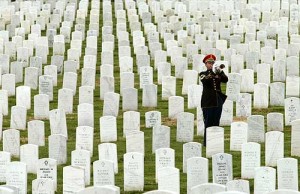
That’s what they call it in Britain. It’s Memorial Day here but the spirit is the same.
On both sides of the Atlantic we have come to associate the red poppie with remembrance of our war dead because of some words by Canadian Colonel John McCrae.
McCrae had served as a gunner in the Boer War in South Africa and later been a Professor of Medicine at McGill University of Canada. After the outbreak of World War I, Colonel McCrae went to France as a medical Officer with the First Canadian Contingent.
There Colonel McCrae, in charge of a small first-aid post near the second battle of Ypres in 1915, took a pencil and wrote a poem on a page torn from his notebook. Ninety-five years later, most of us can recite at least a portion of the words he wrote:
In Flanders’ fields the poppies blow
Between the crosses, row on row
That mark our place, and in the sky
The larks still bravely singing, fly
Scarce heard amid the guns below.
We are the dead, short days ago
We lived, felt dawn, saw sunset glow.
Loved, and were loved, and now we lie
In Flanders’ fields.
Take up our quarrel with the foe,
To you from failing hands we throw
The Torch: be yours to hold it high!
If ye break faith with us who die
We shall not sleep, though poppies grow
In Flanders’ fields.
Someone, perhaps McCrae himself, anonymously sent his verses to the English magazine, Punch, which published them under the title, “In Flanders’ Fields.” The poem was taken to heart by countless American families who eventually had loved ones buried in one of those rows of crosses at Flanders.
A young American woman named Moira Michael was deeply moved by McCrae’s poem and wrote an American reply. She called it “We Shall Keep the Faith”:
Oh! You who sleep in Flanders’ fields,
Sleep sweet – to rise anew,
We caught the torch you threw,
And holding high we kept
The faith with those who died.
We cherish too, the poppy red
That grows on fields where valour led.
It seems to signal to the skies
That blood of heroes never dies,
But lends a lustre to the red
Of the flower that blooms above the dead
In Flanders’ fields.
And now the torch and poppy red
Wear in honour of our dead.
Fear not that ye have died for naught
We’ve learned the lesson that ye taught
In Flanders’ fields.
Colonel McCrae died while on active duty in 1918. The night before he passed away he is said to have told his doctor: “Tell them this. If ye break the faith with us who die, we shall not sleep.
I can’t presume to speak for other places. But I know here in Texas we will not break the faith with those who died.
God bless, keep and comfort you Gold Star families.






